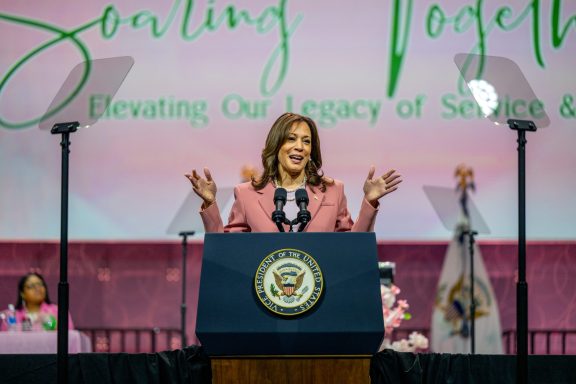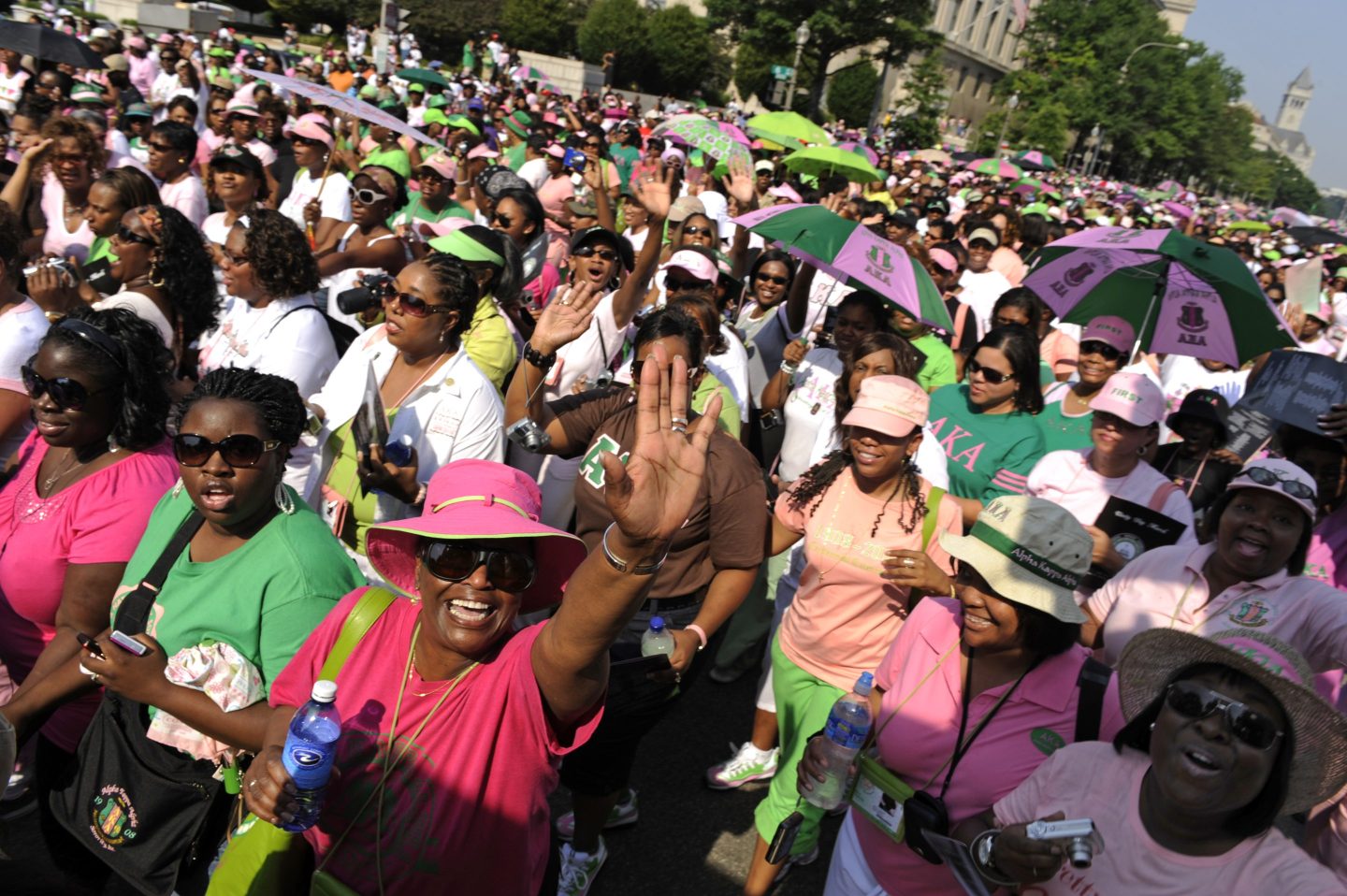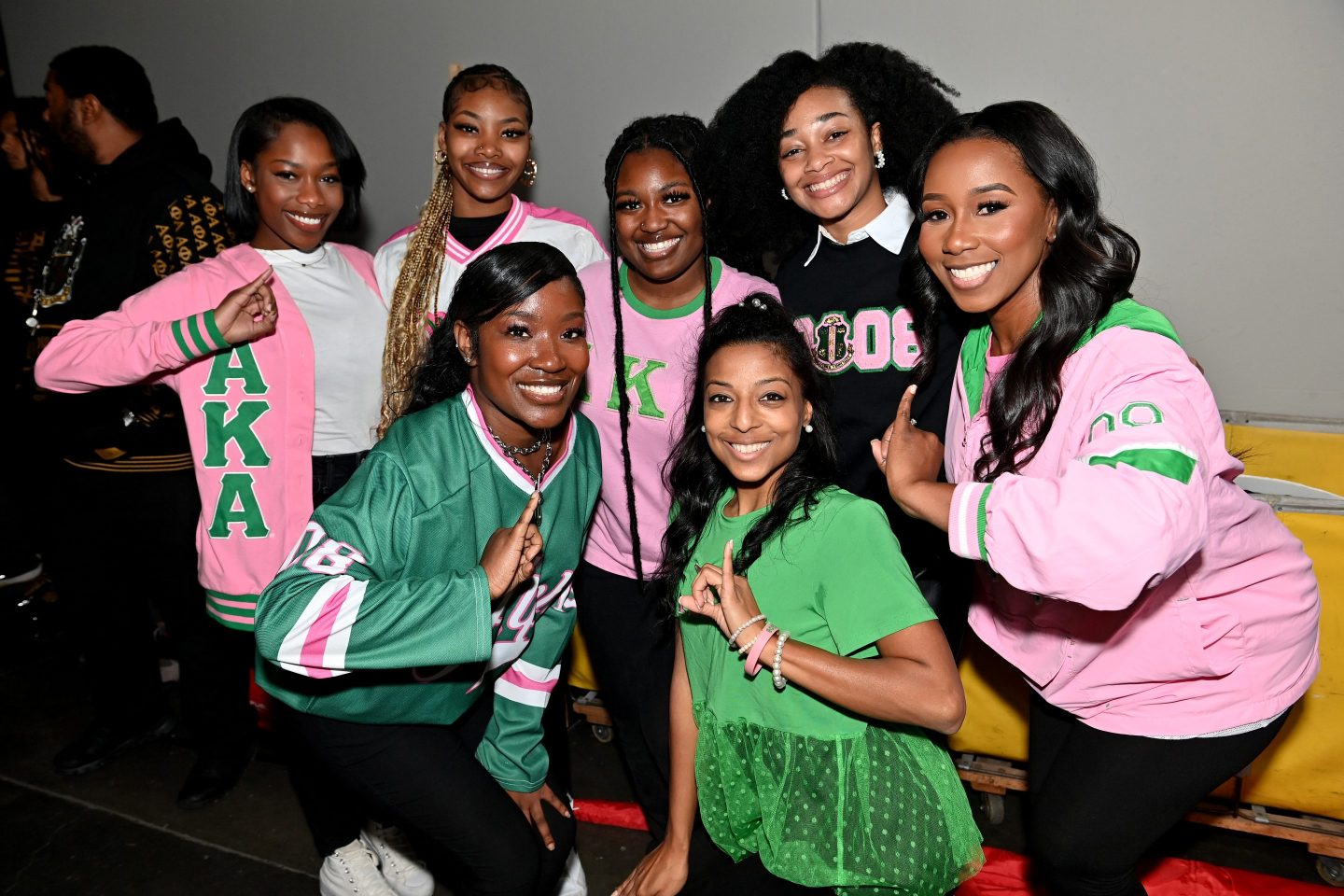Inside Alpha Kappa Alpha, the historic sorority Kamala Harris says changed her life
The 116-year-old Black sorority has more than 360,000 members and focuses on leadership, scholarship, service, and excellence.

Clarice Redding Louis says she’ll never forget the day she was first introduced to Alpha Kappa Alpha Sorority Inc. It was 2008 and she was 18 years old—a fresh high-school graduate visiting Washington, D.C. as part of an exclusive Bank of America student leadership program. Louis was one of 200 people hand-picked from across the globe for a paid summer internship, which culminated in a week-long trip to D.C. to learn about the importance of government, private sector, and nonprofit organizations working together to improve communities.
But what most surprised her at the outset of her trip was seeing so many people decked out in salmon pink and apple green, Louis told Fortune. Thousands of Alpha Kappa Alpha members from all over the world had congregated at the nation’s capital for the organization’s centennial celebration. Even the White House donned pink and green banners, the official colors of the first Black college Greek-letter sorority for educated women.
Louis remembers stopping at a Starbucks and running into some AKA ladies who gave her the spiel about the organization, which has now recently entered the spotlight thanks to one of its most high-profile members, Democratic presidential candidate Kamala Harris, who said being an AKA changed her life.
“They told me what each of their careers were and what drew them to the organization,” said Louis, a doctor of education and director of advancement for Community Partners of South Florida. “I was in love from that moment. That was July 12, 2008. I’ll never forget the date.”

Getty Images—The Washington Post
Like Louis, AKA sorority members take pride in the moment they first learned about the organization—and when they knew they were meant to join. Many of the whopping 360,000 initiated members across the world are legacy, meaning a relative had also been a member of the organization before them.
Lori Sloan has been an AKA member for 37 years, inspired by the membership of her late aunt. Her aunt “was a very active member” until she died in her 90s, “so I knew that it was something that was a lifelong commitment,” Sloan told Fortune. Sloan joined AKA as a member of Purdue University’s chapter.
Now, the 116-year-old organization has more than 1,000 chapters in 11 countries and all 50 U.S. states. But it all started at Howard University with its alpha chapter, back in 1908.
At the time of its origination, the organization’s founders were among the fewer than 1,000 Black Americans enrolled at higher education institutions. And since its founding, AKA has been dedicated to civil-rights causes and five basic tenets: high scholastic and ethical standards, unity and friendship, social stature of girls and women, a “progressive interest in college life,” and being of “service to all mankind.”
How to become a member of Alpha Kappa Alpha
Alpha Kappa Alpha members can join the organization either as an undergraduate student or become a part of a graduate chapter if they’ve already earned a bachelor’s or an advanced degree from an accredited four-year college or university. They have to be invited to join the chapter, and it’s dissimilar from panhellenic sorority recruitment popularized in recent years on social media. Membership in AKA goes far beyond sporting pink, green, and pearls, and stepping and strolling. It’s a lifelong commitment to leadership and service.
Prospective AKA members must demonstrate the tenets of the sisterhood—and many are campus leaders even before joining the chapter. Academic excellence is also crucial for membership: Individual chapters typically have GPA or other scholastic-related benchmarks in place to assess the prospective member’s success.
“We are looking for women of high scholastic and ethical standards [and have a] litmus for who we accept as members,” Deidra Davis, graduate adviser of the AKA chapter at Howard, told Fortune. “It’s no wonder why many are so impressed by women that they see on campus.”
Davis has been an AKA member for 37 years and was in Howard’s chapter at the same time as Vice President Harris. Davis joined AKA the year after Harris had been initiated, and had admired her and the other women who had joined the organization before her. Davis was “really taken by the level of excellence and the level of leadership” Harris exuded during her time at Howard and in AKA.
“Many of the AKAs, including Kamala at the time, just had a presence on campus and were always actively involved in serving others and leading things on the university campus,” Davis said. “That’s what drew me and piqued my interest in being a part of that same group.”
That sentiment still resonates with current members at Howard, including Imani Smith, who currently serves as president of the chapter.
“Coming in as a freshman, my first interactions with student leaders were ladies of the alpha chapter,” Smith told Fortune. “It’s really just inspiring seeing the level of service that we exude in the commitment that we make to it.”
A history of and commitment to service
Alpha Kappa Alpha’s commitment to service became increasingly important in the 1930s, during the time The New Deal was enacted. The group expanded its mission to ensure Black Americans benefited from New Deal jobs and entitlement programs such as Social Security, and also worked to abolish requirements for federal-government jobs that required a photograph of the applicant. This was a practice that led to racial discrimination in hiring.
The organization also successfully lobbied for admission of Black women into the U.S. Navy during World War II and established the American Council on Human Rights in June 1948, although the organization is officially non-partisan. AKA, through the American Council on Human Rights, also worked to ensure fair employment and wages, advance Black voting rights, and demand access to decent, non-segregated housing.
“As a long-time activist and organizer, I was looking for a sisterhood that really resonated with who I am as a person. And Alpha Kappa Alpha is exactly that,” Nupol Kiazolu, who was initiated into AKA’s chapter at Hampton University in 2021, told Fortune. “We have a longstanding track record of service and empowerment to the Black community, and not just the Black community, but the American community, and the communities all across the globe.”
Although all founding members of AKA exuded a commitment to service, one sticks out for Kiazolu: Norma Elizabeth Boyd, who in 1938 founded the National Nonpartisan Council of Public Affairs—the first Black congressional lobby—which laid the groundwork for the Civil Rights Movement before its height in the 1960s. Boyd also happens to be Harris’ favorite AKA founder.

Getty Images—Brandon Bell
“Our sisterhood was also founded, as we know, in the face of profound challenges in our country,” Harris said in a July 2024 address to AKA. “And yet, despite all of this, and perhaps because of it, our founders believed in the power of sisterhood and service. And our founders believed in the promise of America—a promise of freedom, opportunity, and equality not for some but for all.”
Sisterhood, leadership, and excellence
Even after years—or decades—away from college, AKA sisters continue to support each other in a variety of ways. These bonds are part of what makes the organization so strong.
Take Louis, for example, who knew she wanted to pursue a career in mental health and education, and was supported by mentorship from her AKA sisters. But what she didn’t expect was the outpouring of support to pursue a master’s degree. One day at a chapter meeting, the president explained to members the importance of Louis and a few other members continuing their education. That day, Louis and four other AKA members left the meeting with a $25,000 check, which took care of Louis’ entire master’s program.
The support didn’t stop there. When Louis decided to go for her Ph.D., she was given a check from AKA “of a significant amount” to earn her degree.
Louis said she felt “like I had the power of this entire organization behind me, propelling me through this process.” But beyond schooling, she has been supported by her sisters in numerous ways—including the delivery of her first child last year. One of Louis’ AKA sisters was her OB-GYN, and made sure she was taken care of “given all the health care disparities with Black maternal health,” Louis said. “She made sure every step of the way I had every comfort and luxury available to me.”

Getty Images—Paras Griffin
AKA also instills in women leadership qualities that extend well beyond their years on campus. They are taught how to interview for jobs, how to dress, and how to conduct meetings, Sloan said. These are all important qualities whether you’re an organizational leader or in the running to be the next president of the United States.
And being a member of AKA also has networking perks—especially if you can identify members by the colors and jewelry indicative of sorority membership.
“The sisterhood continues post graduation from college,” Sloan said. “You go on a job interview, you get a job, you discover you have sisters there, and they take you under their wing. You have an insight to learn the company, the ins and outs, because the sisterhood never goes away. And that’s the comfort and support that you continuously have.”





